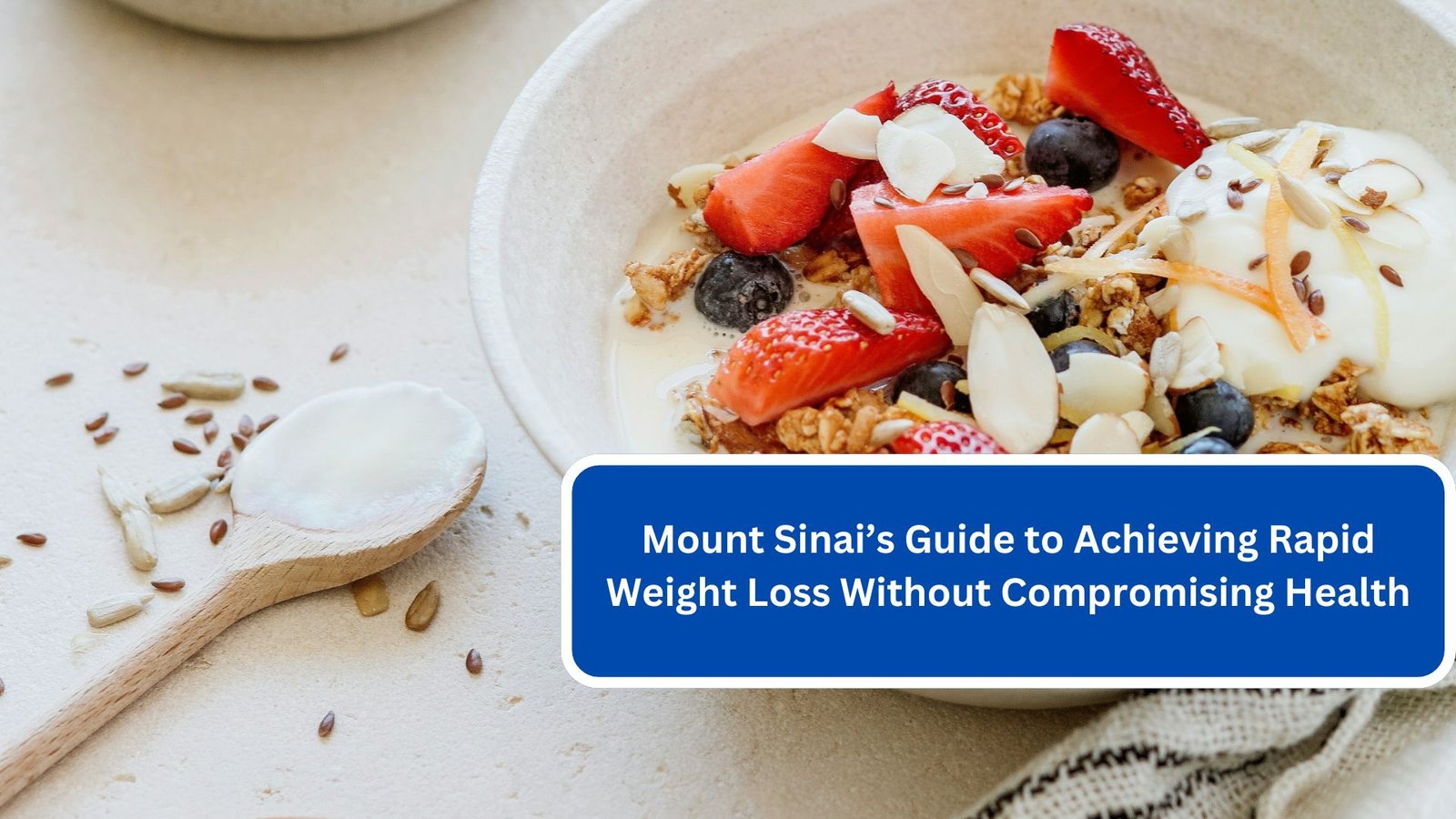Achieving rapid weight loss is a common goal for many individuals seeking to improve their health, fit into a new outfit, or boost their confidence. However, the desire for quick results can lead to unhealthy practices that ultimately compromise physical well-being. Mount Sinai, a leader in medical research and healthcare, offers evidence-based strategies to achieve rapid weight loss safely and effectively. This guide outlines how to lose weight quickly while prioritizing health through balanced nutrition, mindful practices, and professional support.
Understanding the Need for Rapid Weight Loss
Why People Seek Rapid Weight Loss
Various reasons drive individuals to pursue rapid weight loss, including:
- Upcoming Events: Weddings, reunions, and vacations often motivate people to shed pounds quickly.
- Health Concerns: Conditions such as obesity, diabetes, or hypertension may require urgent weight loss to prevent further health complications.
- Personal Goals: Many individuals desire to enhance their physical appearance or athletic performance.
The Risks of Unhealthy Weight Loss Practices
While the appeal of rapid weight loss is strong, many popular diets and extreme measures can lead to serious health risks, including:
- Nutritional Deficiencies: Severely restricted diets can deprive the body of essential nutrients.
- Metabolic Slowdown: Extreme caloric restriction can slow down metabolism, making it harder to maintain weight loss in the long term.
- Muscle Loss: Rapid weight loss often results in the loss of lean muscle mass, negatively impacting overall health and metabolism.
- Mental Health Issues: Crash diets can lead to an unhealthy relationship with food and eating disorders.
Mount Sinai’s Safe and Effective Strategies
1. Focus on Balanced Nutrition
A balanced nutritional approach is the cornerstone of Mount Sinai’s weight loss philosophy. This involves consuming a variety of nutrient-dense foods that provide essential vitamins, minerals, and macronutrients.
Macronutrient Balance
- Proteins: Incorporating lean proteins like chicken, fish, tofu, and legumes helps build and repair tissues while promoting feelings of fullness.
- Carbohydrates: Opting for whole grains, fruits, and vegetables provides energy and essential nutrients without excess calories.
- Fats: Healthy fats from sources like avocados, nuts, and olive oil support satiety and overall health.
2. Caloric Deficit with Mindfulness
Creating a caloric deficit is essential for weight loss. This means consuming fewer calories than the body expends. However, Mount Sinai advocates for a mindful approach to achieving this deficit.
Mindful Eating Practices
- Portion Control: Use smaller plates and bowls to naturally reduce portion sizes.
- Savor Your Food: Take time to enjoy meals, chewing slowly and appreciating flavors to enhance satisfaction and prevent overeating.
- Listen to Your Body: Pay attention to hunger and fullness cues to guide eating habits.
3. Incorporate Regular Physical Activity
Exercise is a critical component of any weight loss strategy. Mount Sinai recommends a combination of cardiovascular and strength training exercises.
Types of Exercise
- Cardiovascular Exercises: Activities like walking, running, cycling, and swimming help burn calories and improve heart health. Aim for at least 150 minutes of moderate-intensity cardio each week.
- Strength Training: Engaging in resistance exercises 2-3 times a week helps build muscle mass, which can boost metabolism and aid in weight maintenance.
4. Stay Hydrated
Hydration plays a vital role in overall health and weight management. Drinking sufficient water can support metabolism and help control hunger.
Hydration Tips
- Drink Water Before Meals: Consuming water before eating can reduce overall calorie intake by promoting a sense of fullness.
- Limit Sugary Drinks: Avoiding sodas, juices, and other high-calorie beverages can significantly reduce caloric intake.
5. Seek Professional Support
Mount Sinai emphasizes the importance of seeking guidance from healthcare professionals, including registered dietitians and nutritionists. Personalized support can help individuals navigate their weight loss journey effectively.
Benefits of Professional Guidance
- Tailored Meal Plans: Registered dietitians can create customized meal plans that align with individual needs and preferences.
- Monitoring Progress: Regular check-ins with a healthcare professional can provide accountability and motivation.
- Behavioral Strategies: Professionals can offer strategies to address emotional eating and other barriers to weight loss.
The Importance of Sustainable Practices
Avoiding Quick Fixes
While rapid weight loss may be desirable, it is crucial to avoid extreme diets or drastic measures that jeopardize health. Mount Sinai advocates for sustainable practices that promote lasting results.
Key Elements of Sustainability
- Gradual Weight Loss: Aim for a steady weight loss of 1-2 pounds per week, which is generally considered safe and sustainable.
- Long-Term Lifestyle Changes: Focus on adopting healthy habits that can be maintained over time, rather than temporary fixes.
Building a Positive Relationship with Food
Developing a healthy relationship with food is essential for long-term success. This involves recognizing food as nourishment rather than a source of guilt or shame.
Tips for a Healthy Relationship with Food
- Practice Forgiveness: Understand that occasional indulgences are normal and do not derail overall progress.
- Celebrate Non-Scale Victories: Recognize improvements in energy levels, mood, and physical fitness rather than focusing solely on weight.
Conclusion
Mount Sinai’s approach to achieving rapid weight loss emphasizes the importance of balanced nutrition, mindful practices, regular physical activity, hydration, and professional support. By prioritizing health and well-being, individuals can achieve their weight loss goals without compromising their physical or mental health. Rather than resorting to quick fixes that may lead to adverse outcomes, embracing a holistic and sustainable approach allows for effective and lasting weight management. As individuals embark on their weight loss journeys, Mount Sinai stands as a beacon of evidence-based guidance, ensuring that health remains at the forefront of every goal.

